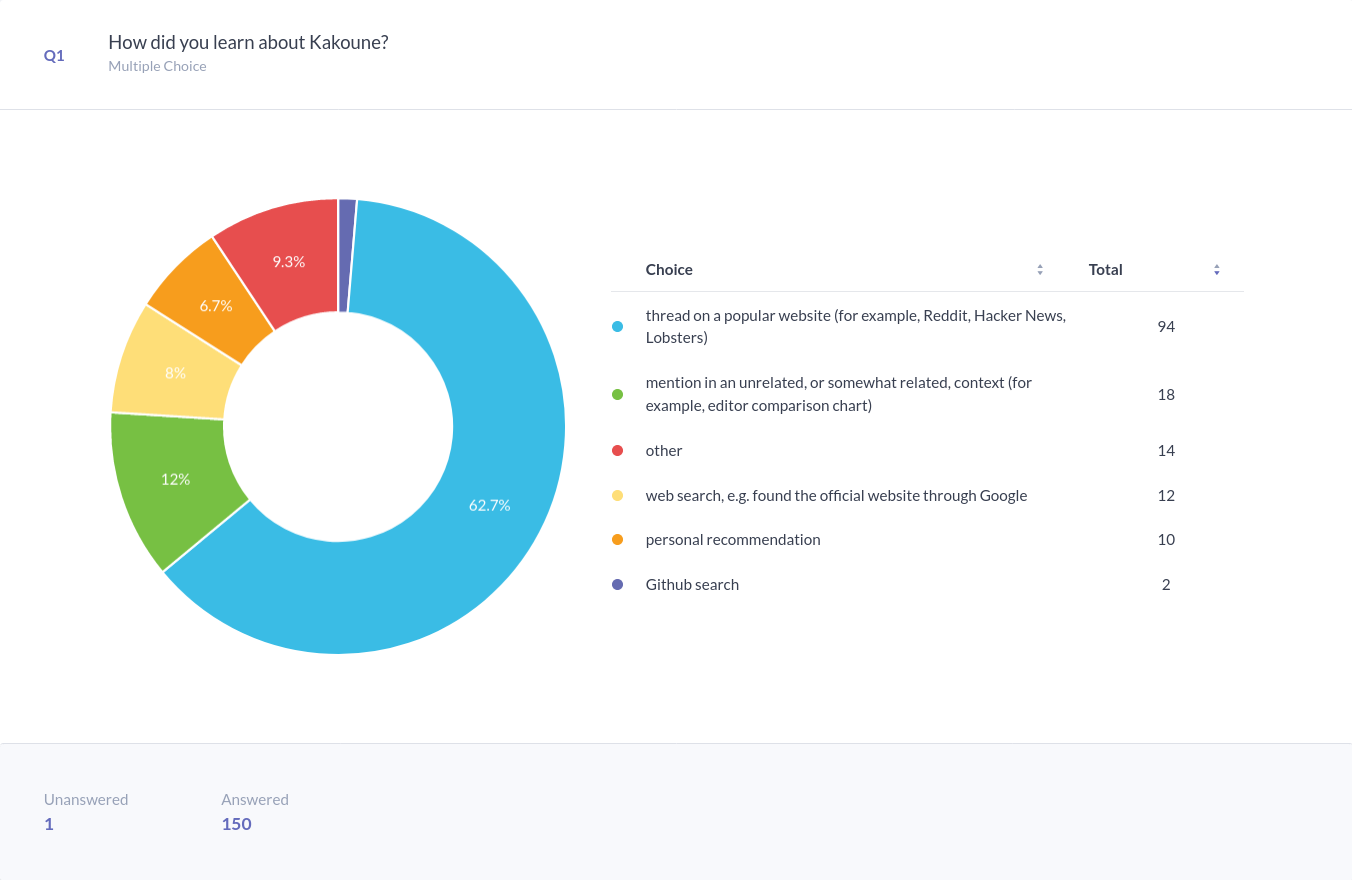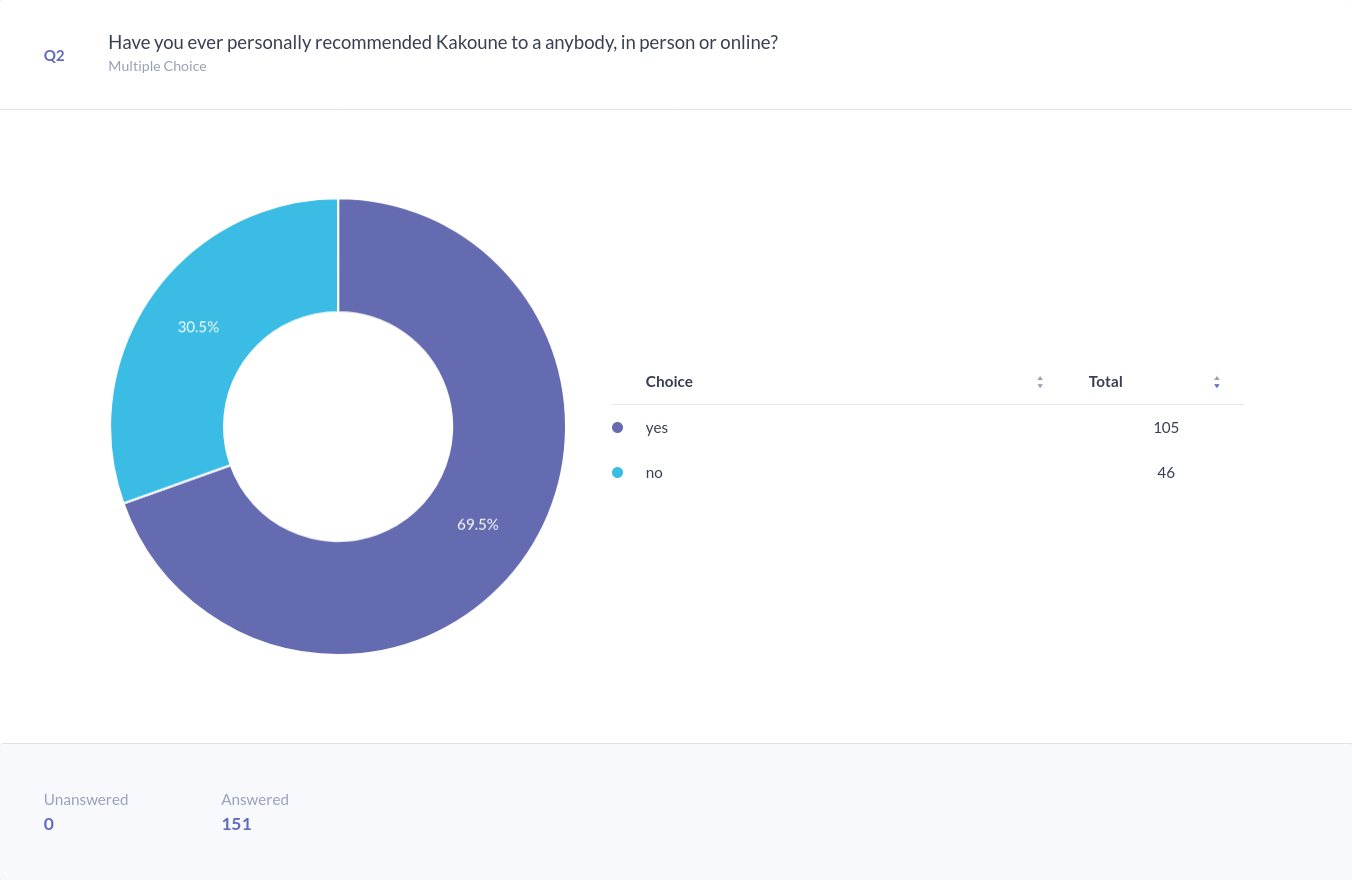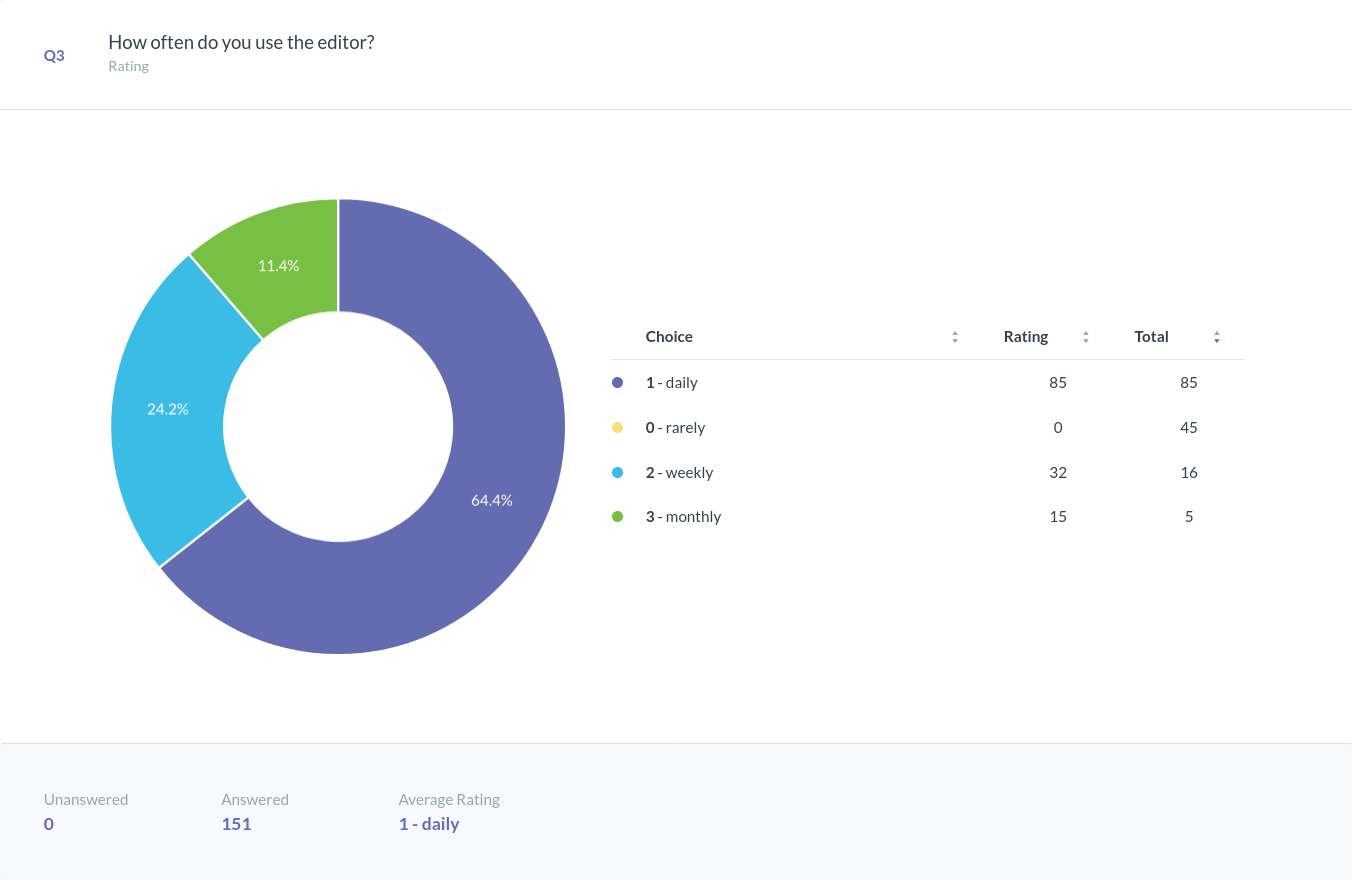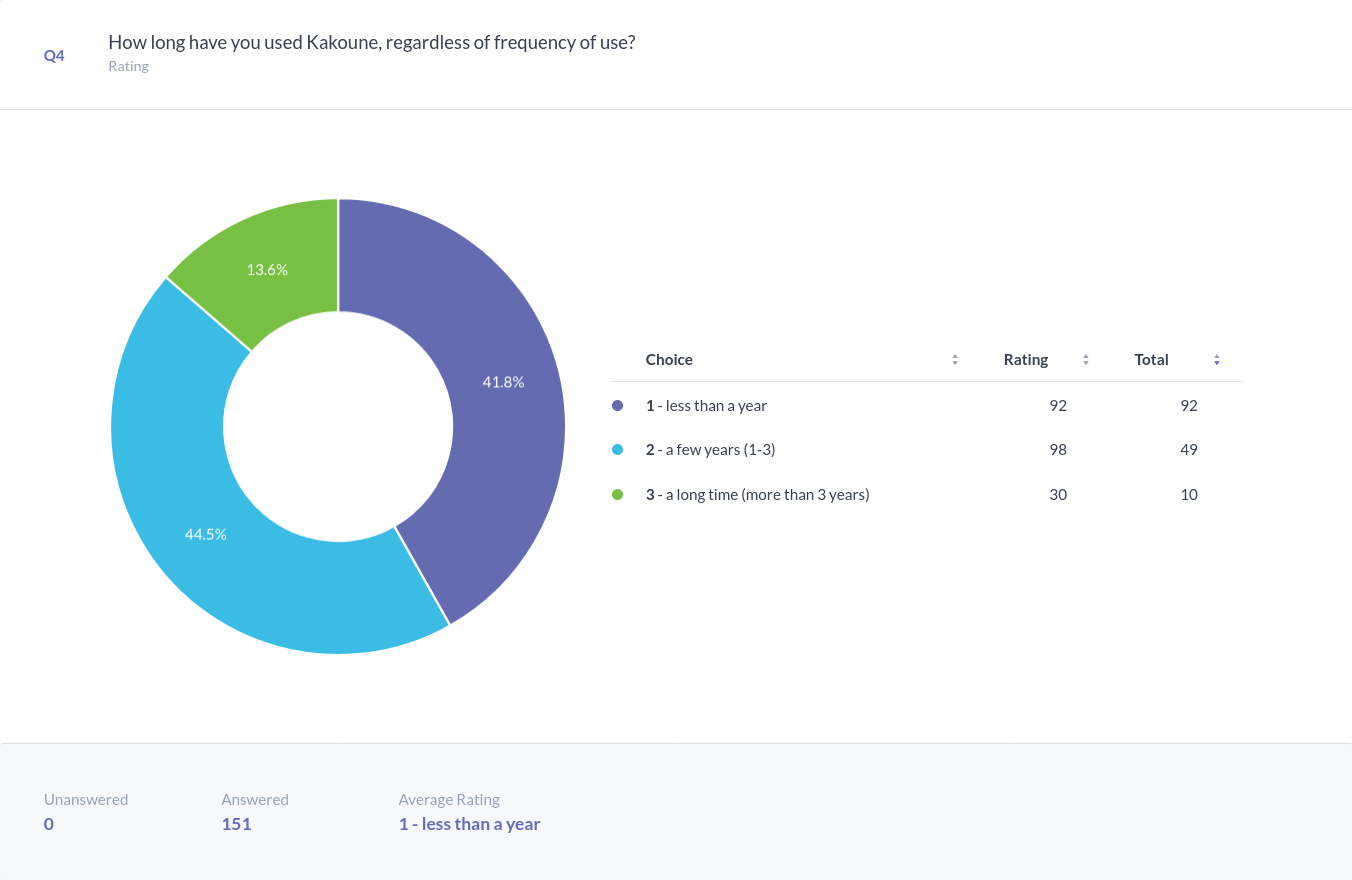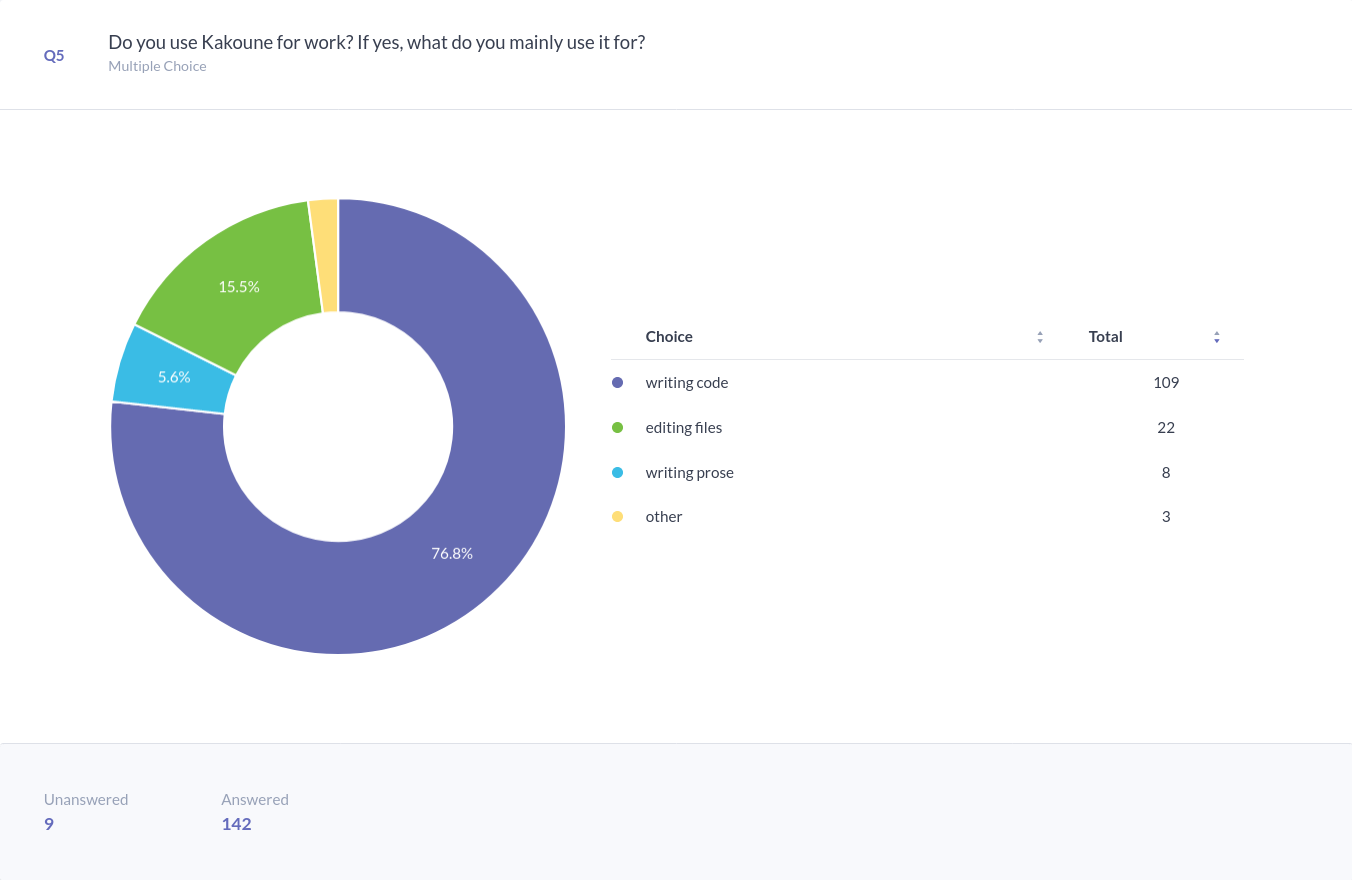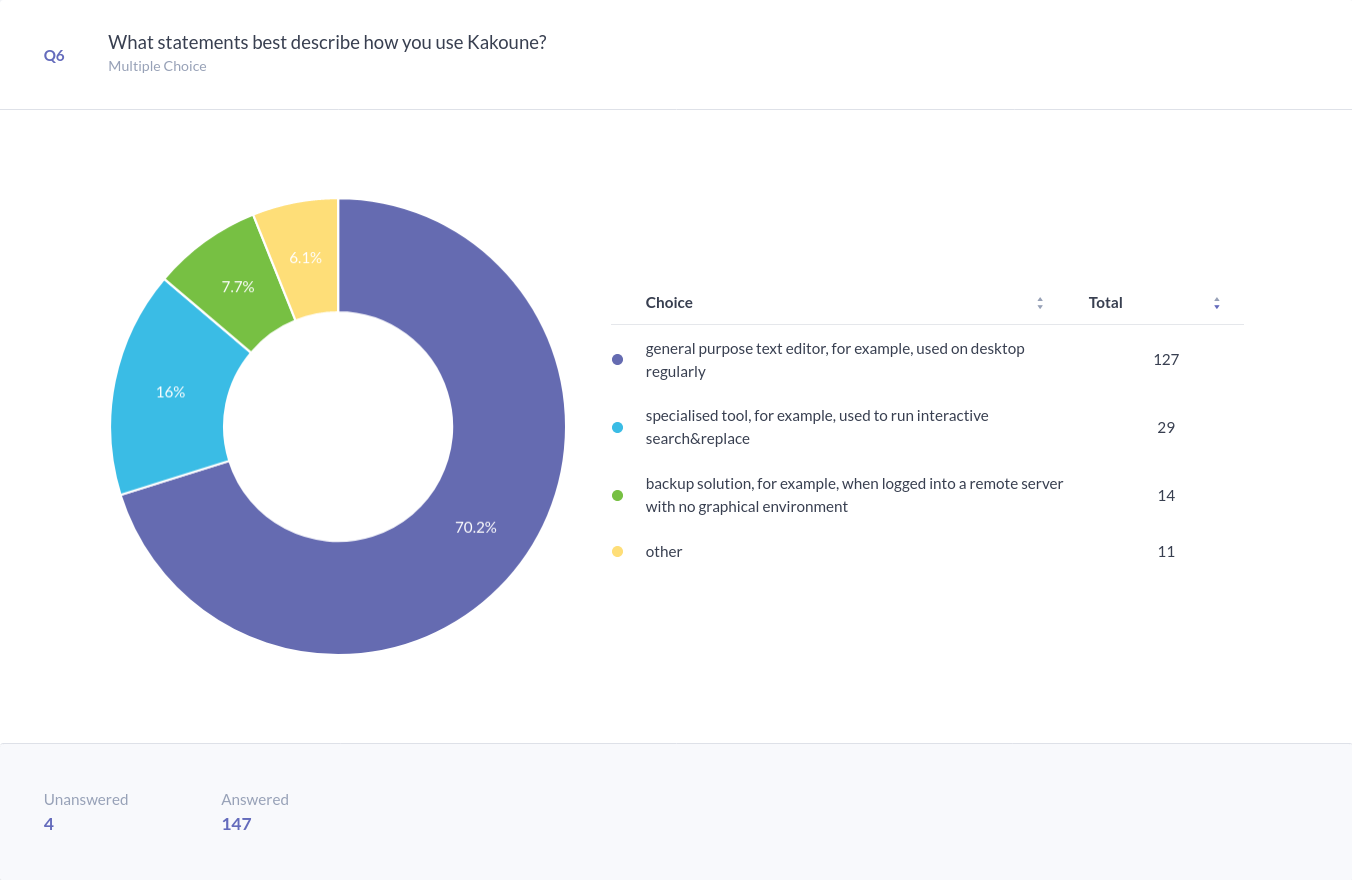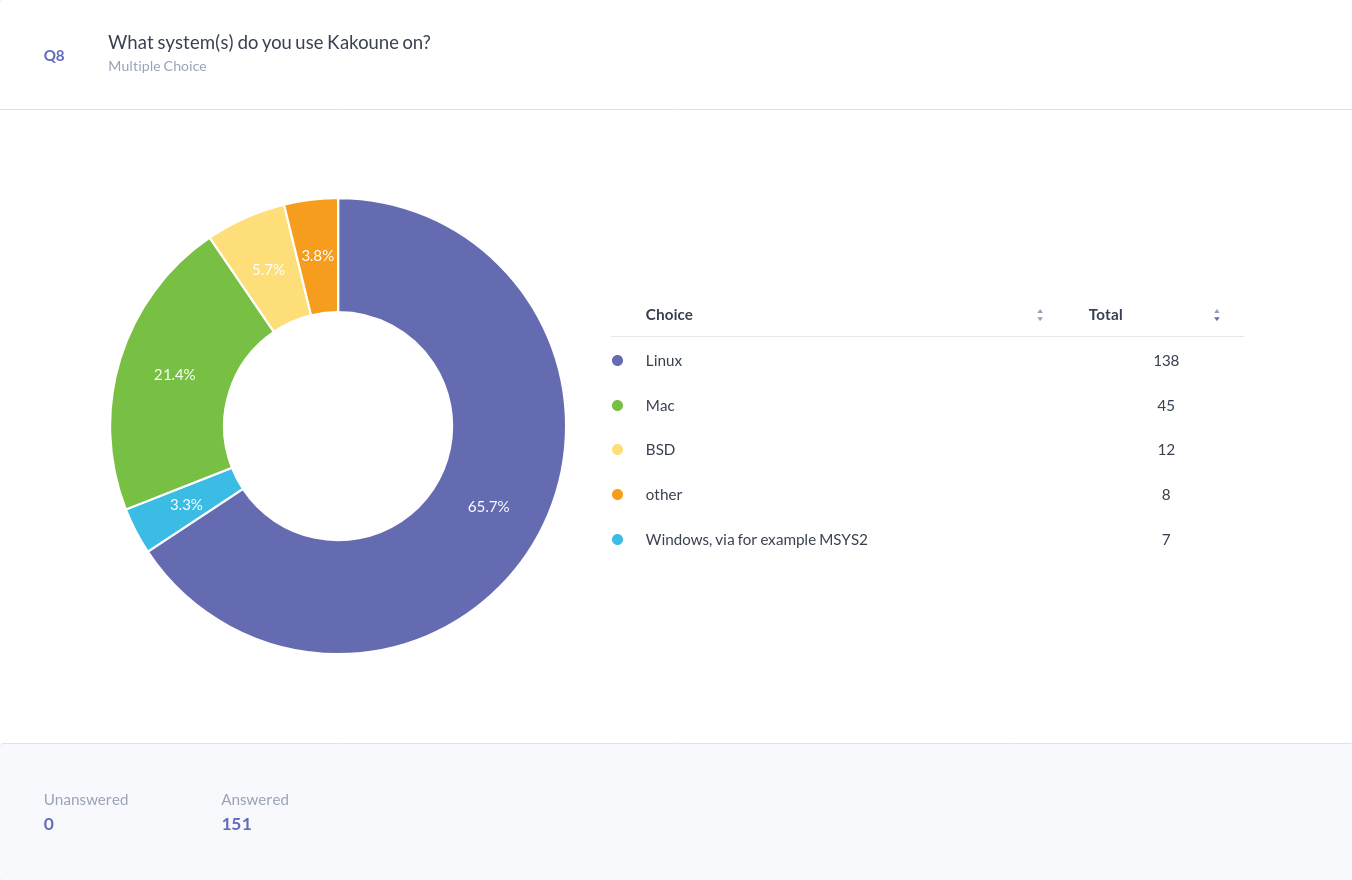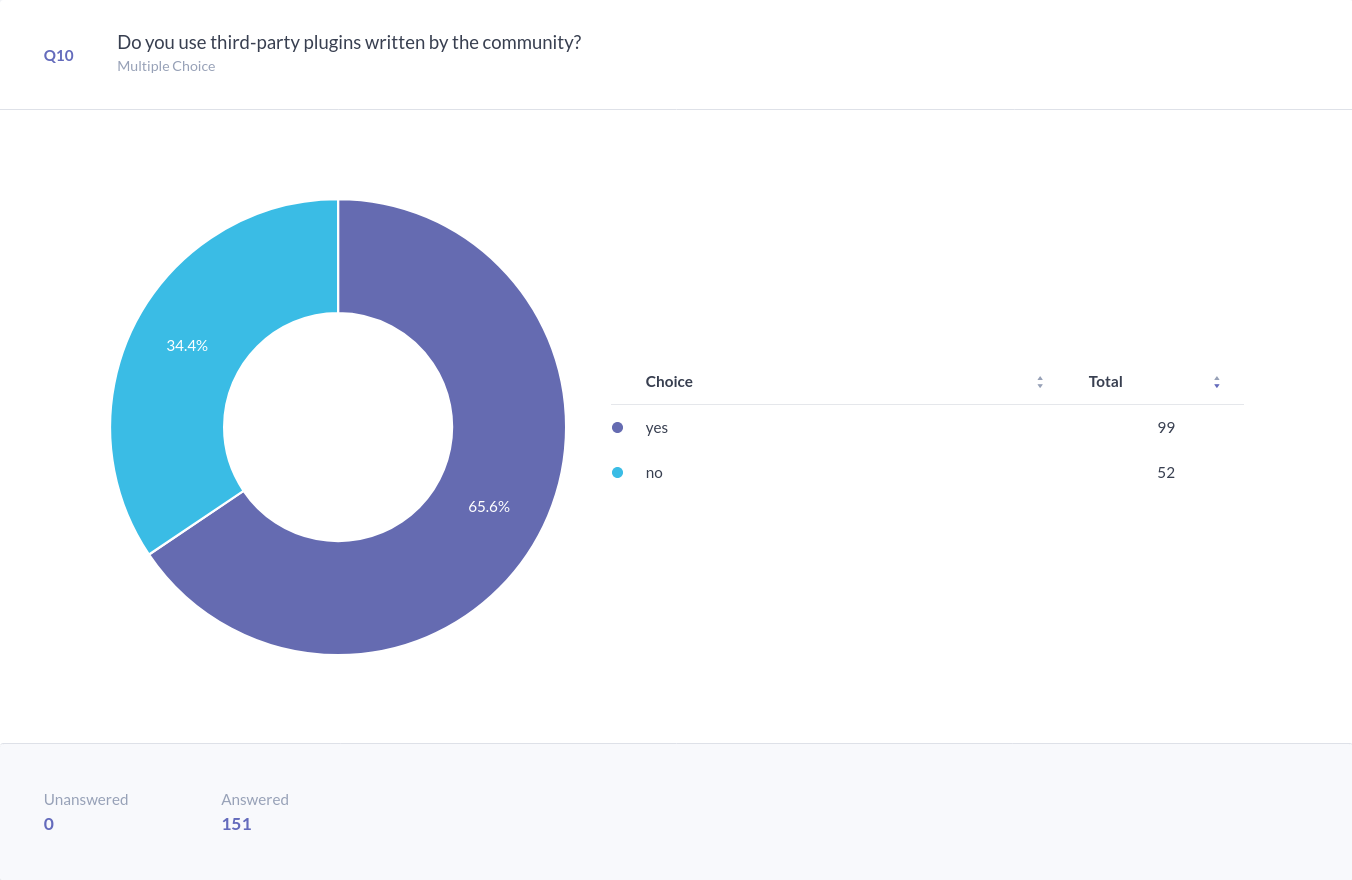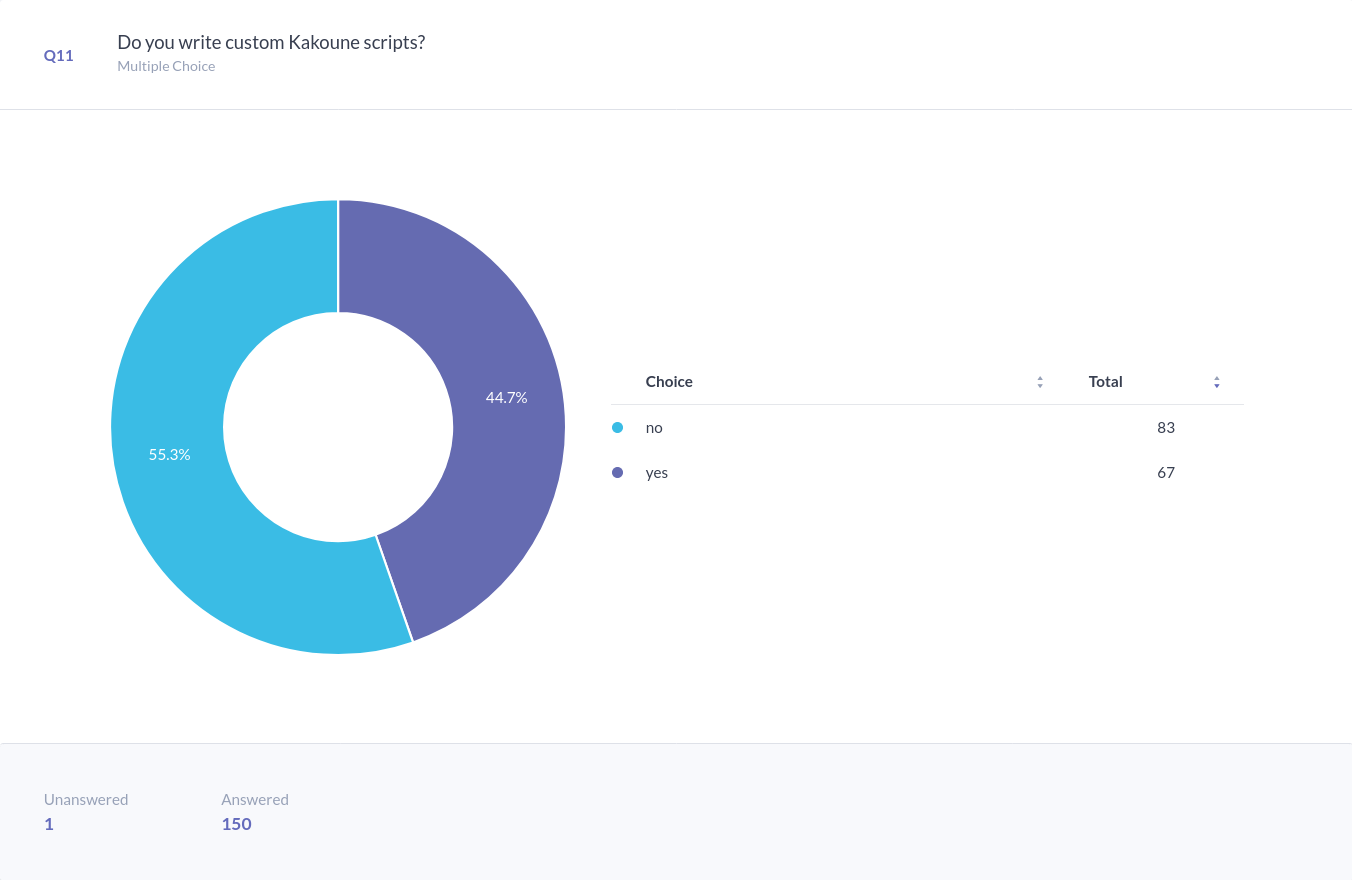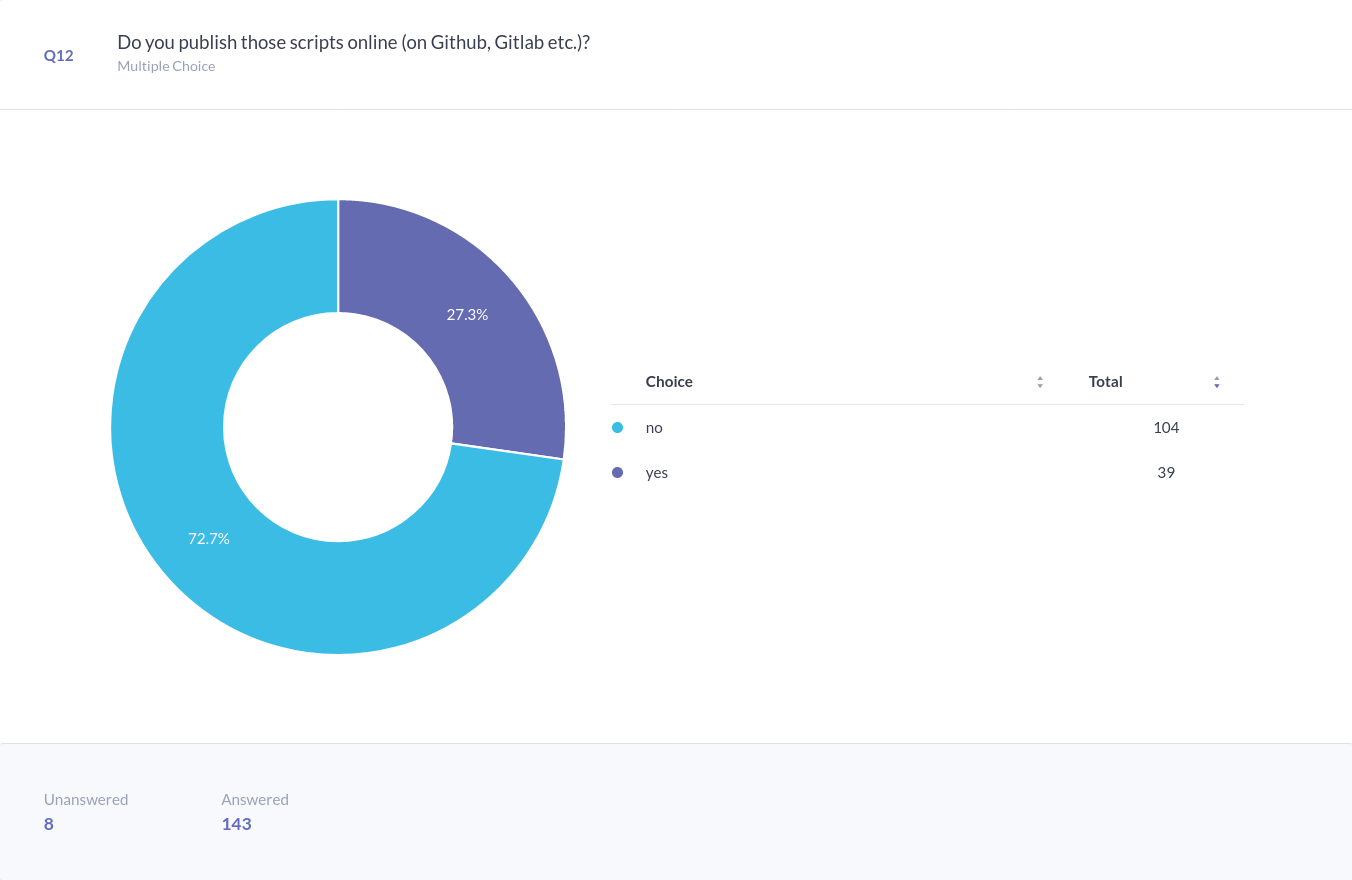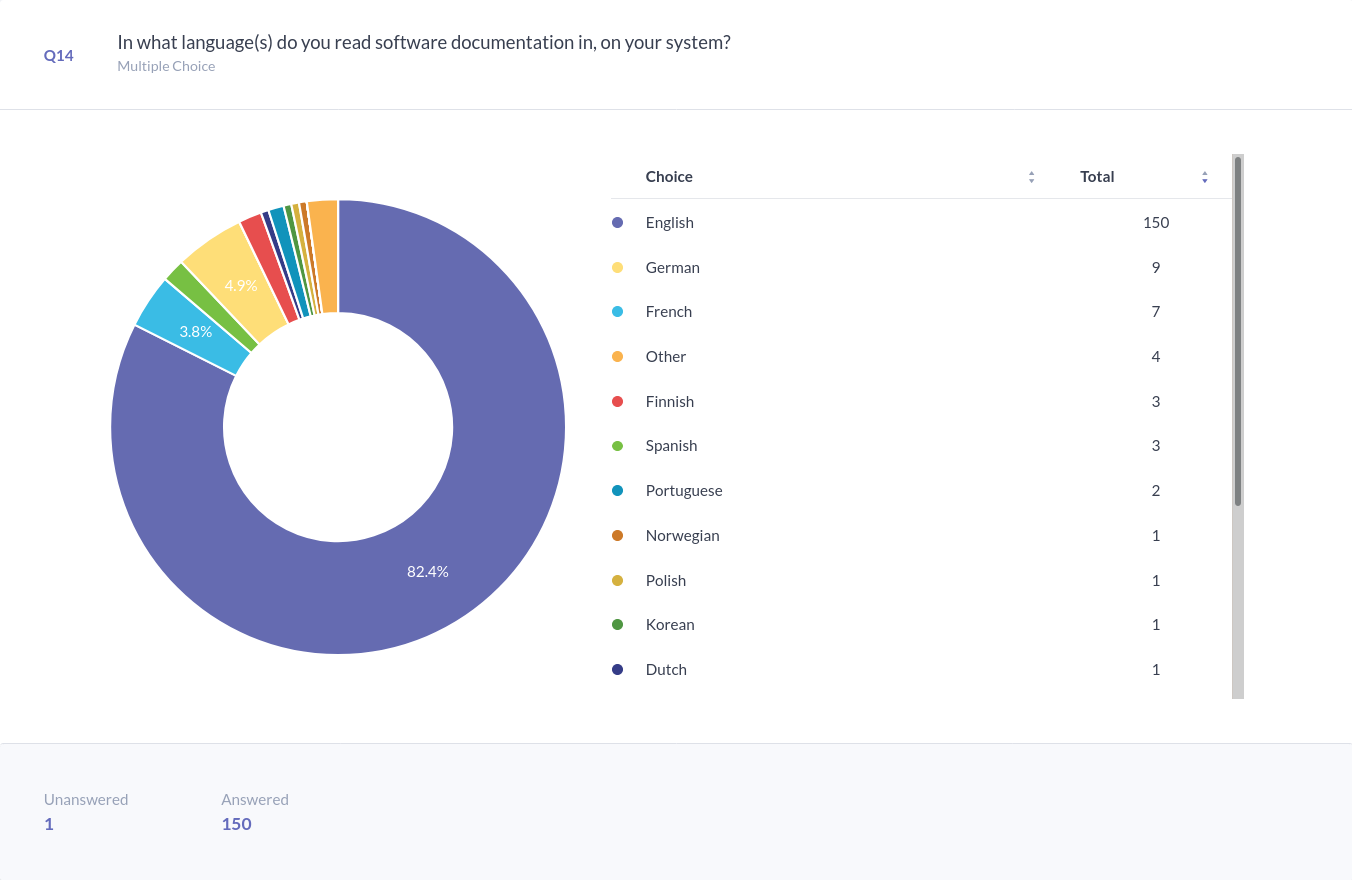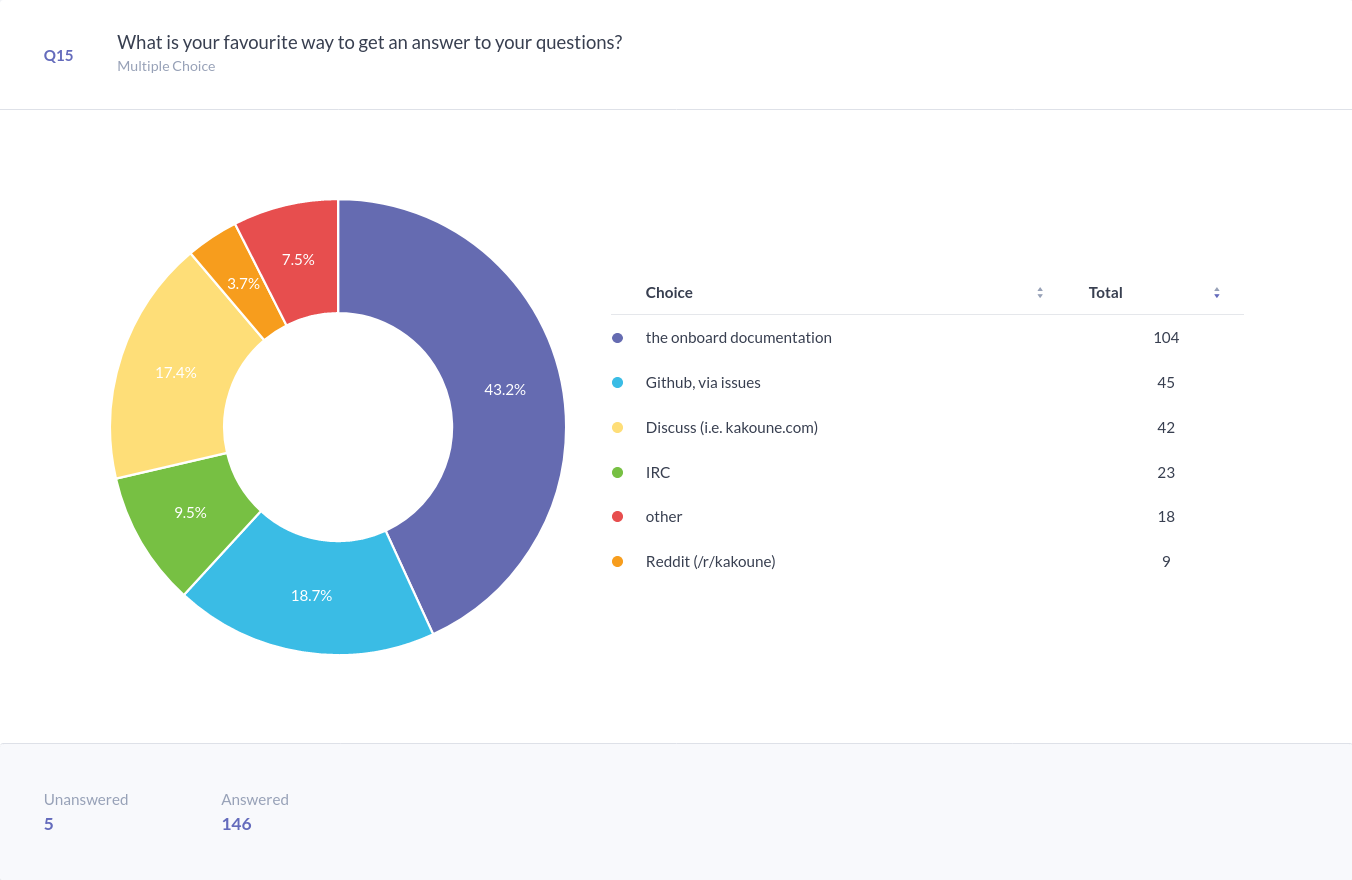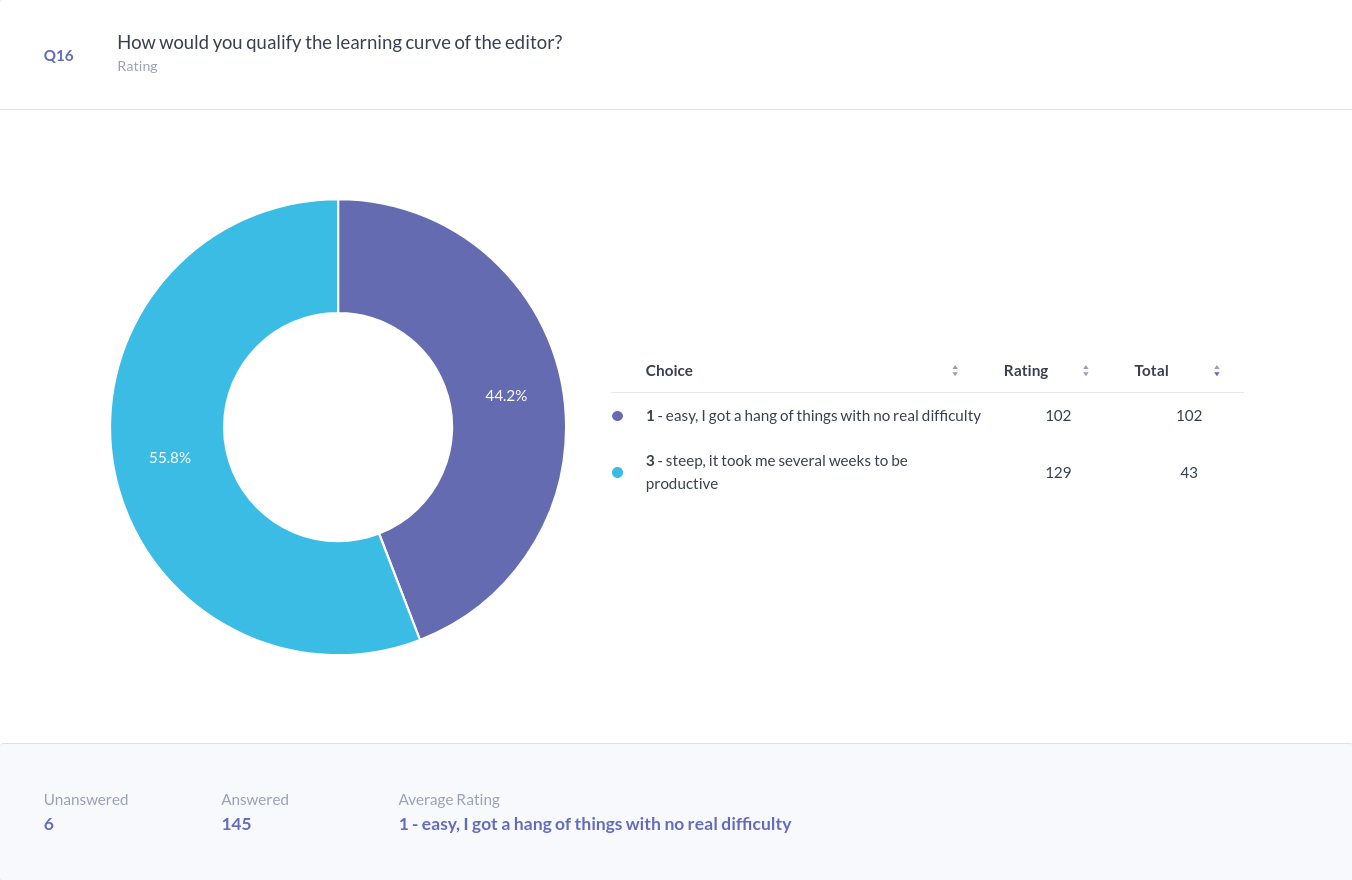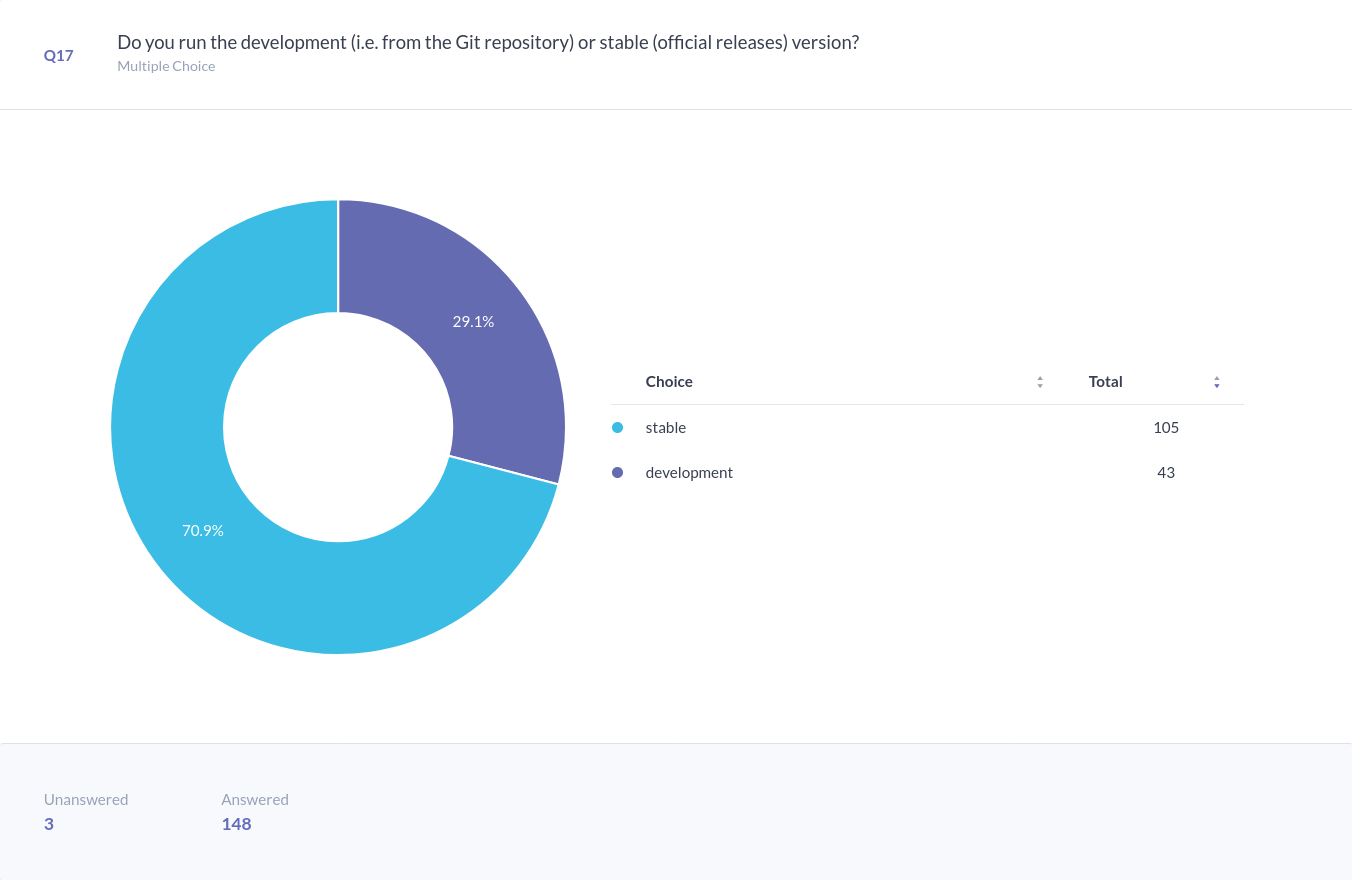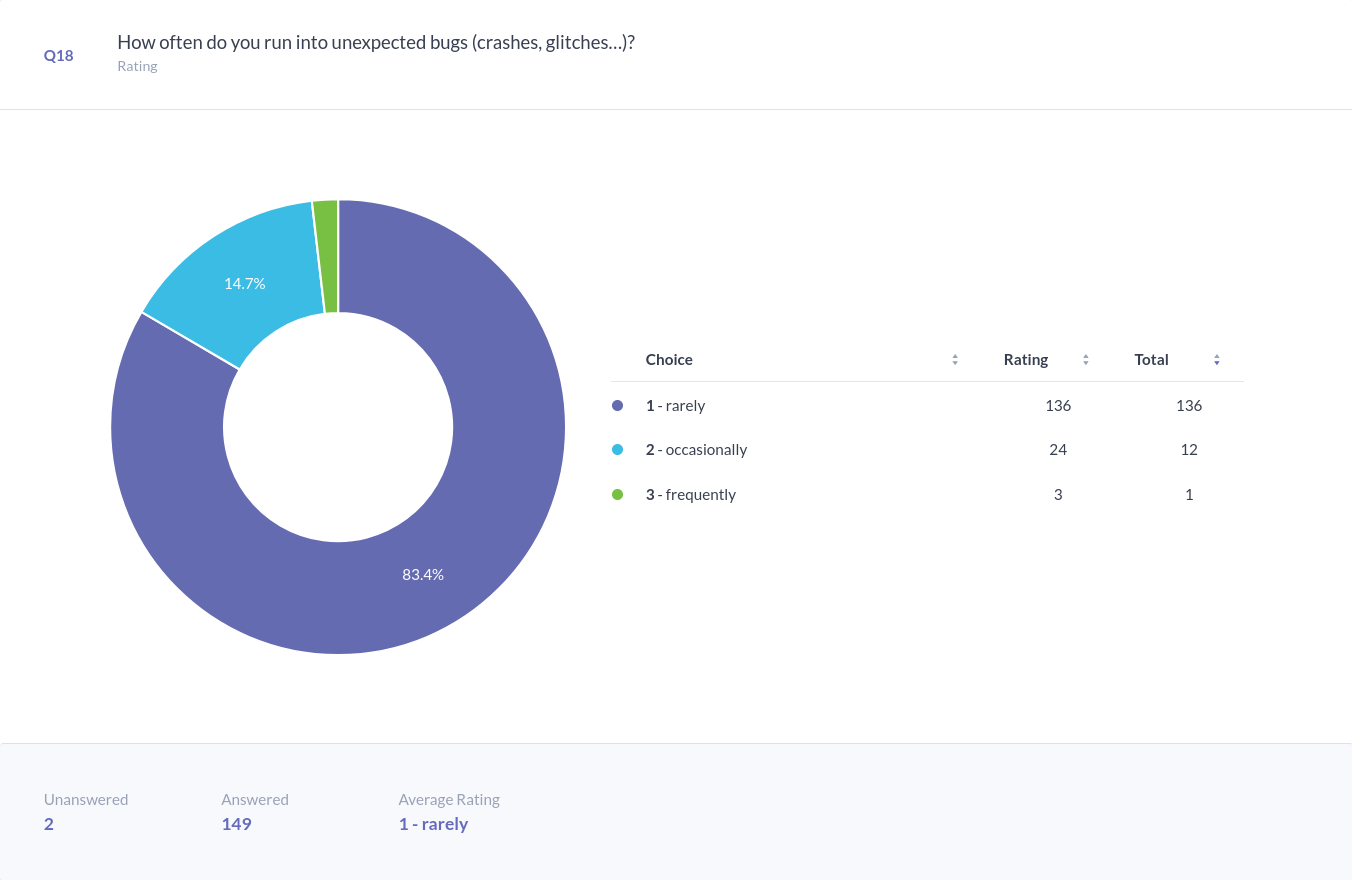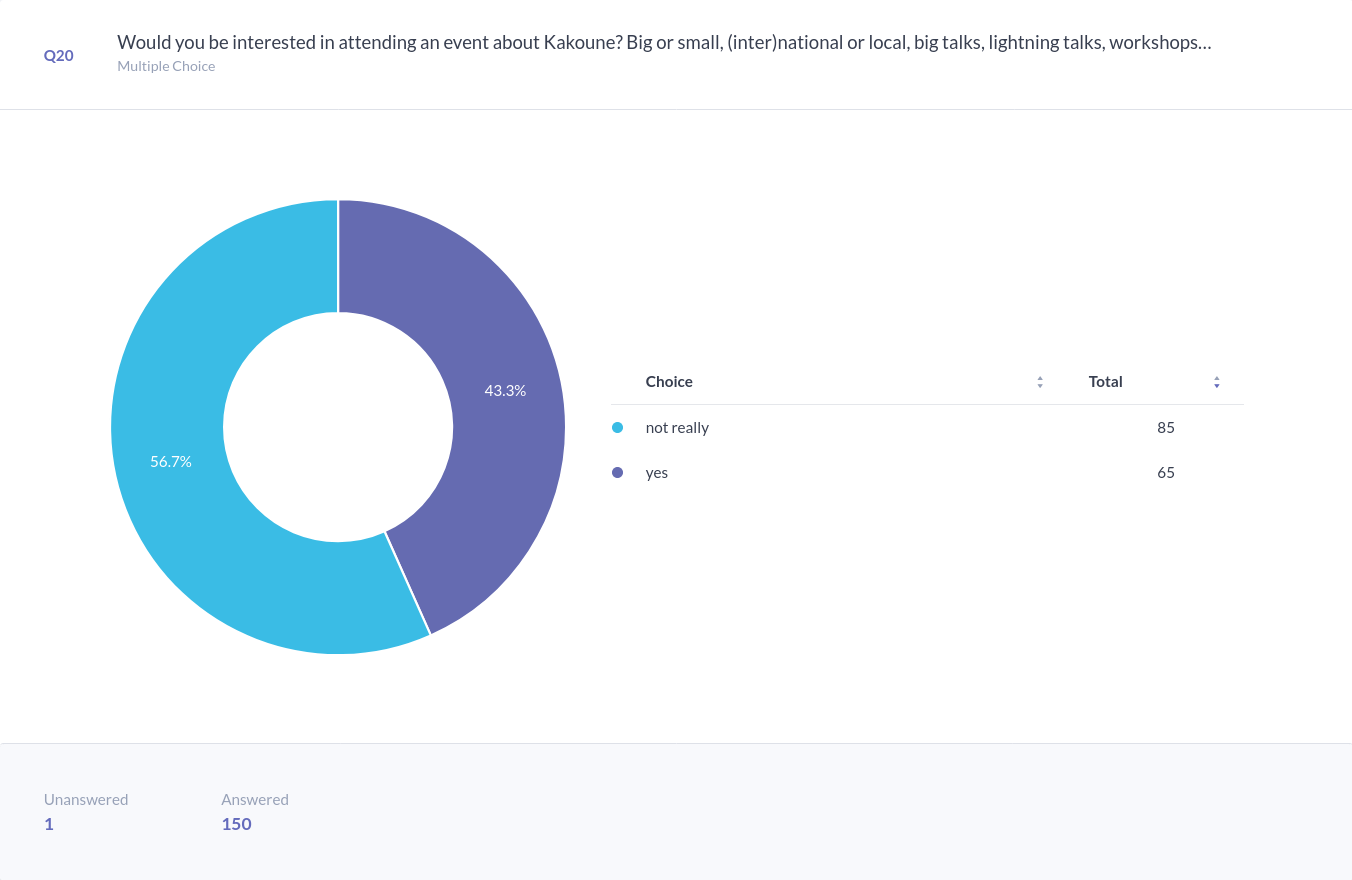Results and their interpretation for the First Kakoune Community Survey
You’ll find below the results to the (now closed) First Kakoune Community Survey, as well as general takeaways derived from them. An interpretation of the data is also provided when relevant. All the specific questions (e.g. the multiple-choice ones) that were asked had for objective to shed some light on a specific point, interpreting the replies is a useful indicator of whether the contributors to the Kakoune editor are headed in the right direction, are aware of the biggest problems the users face, and have an accurate vision of how the tool is being used in the wild.
Note that the raw free-writing type answers will not be attached to this post, as I cannot extract them easily out of the survey platform used for polling. I also wouldn’t like users to hesitate to be open about their opinions of the editor in future polls, out of fear that their words might end up being published (albeit without any identifying information attached to them).
Thanks to the 151 respondents who have donated their precious time to take the survey!
Note: There are only a couple of such questions in the poll, but the percentages in some doughnut graphs are not accurate! The survey platform fooled me into thinking the number associated with a frequency would be an index, to facilitate statistical analysis via programming. Those turned out to be weights for rating computation (second column named “Rating” on the pictures). Changing the values after the fact in the survey platform’s interface resulted into the data being corrupted and unusable, so read the Adjusted data when I provided them, they’re the real numbers.
The questions
Q1: How did you learn about Kakoune?
Social information sharing platforms are the crossroad that directs users towards Kakoune, by far.
Hits from the “internet highway” (search engines) have a low conversion rate in comparison, which could indicate that some SEO work needs to be done on the main site.
Despite being as big as personal recommendations and web searches, the “other” category only presents separate, unrelated, anecdotal data points.
Q2: Have you ever personally recommended Kakoune to a anybody, in person or online?
Two-thirds of users report having personally recommended the editor to somebody else. It shows that the tool has a significant enough impact on its users that most of them would get out of their way to recommend it to others.
However, when stacking these replies with those to the previous question, we can see that a low percentage of those recommendations have resulted in a user adopting Kakoune.
Q3: How often do you use the editor?
Adjusted data:
- daily: 56%
- rarely: 29%
- weekly: 10%
- monthly: 3%
Being branded as a code editor, it’s not surprising that most users report using Kakoune daily.
Close to one third of users report using it “rarely”, which is an unexpected outcome. The silver lining could be that those users still find a corner-case use to the editor on occasion, which apparently cannot be better fulfilled with any other tools. I’ll take 45 “rarely”s over 45 “never”s!
Q4: How long have you used Kakoune, regardless of frequency of use?
Adjusted data:
- less than a year: 60%
- a few years (1-3): 32%
- a long time (more than 3 years): 6%
A reasonable amount of users have stuck around over the years. Future surveys will tell us more about the tool’s retention rate, but I’m confident considering the increasing frequency of discussions in the community (forums, IRC, reddit etc.).
Q5: Do you use Kakoune for work? If yes, what do you mainly use it for?
Out of 142 respondents, 3 explicitly stated they do not use the editor for work (in “other”), and 9 did not reply since the question is predicated on whether the respondent does use Kakoune for work. 92% of users trust the editor to help them fulfill their job duties. That’s a badge of honour in itself considering the focus other bigger editors/IDEs (Integrated Development Environment) place on a self-awarded stamp of work-friendliness, and the total absence of it in Kakoune.
Another nice surprise is that 5% of respondents who use Kakoune for work mostly write generic prose with the editor, showing that the editor is a versatile tool that doesn’t only appeal to programmers.
Q6: What statements best describe how you use Kakoune?
The results are in line with the answers to the previous question. The resolution of the way users interact with the tool is increased here, as almost 20% of users have selected two or more statements (different than “other” or reiterated in the “other” form that they use Kakoune as a specialised tool, option 2). This reveals that the editor is in fact no just a uni-dimensional tool, but a convenient utility suitable in separate situations.
Q7: What is your job title?
As a way to compliment the answers to the previous questions (how the tool is being used), respondents indicated in what capacity they interacted with Kakoune.
Here are the fields the respondents work in:
Software Engineering: 79% Student: 7% Science related fields (data science, mathematics, research…): 5% Unemployed: 2%
Note that one respondent works as a Musician, and another does programming as a hobby, proving once again the versatility of the tool.
Q8: What system(s) do you use Kakoune on?
- 139 respondents use Linux (the poll shows 138, but one respondent used the
otherfield to specifyGNU/Linux) - of those, 50 use the editor on another system, along with Linux; 35 out of those 50 respondents use Mac
- 99 respondents use the editor on only one system: 89 exclusively use Linux, 8 Mac
- out of the 7 respondents who mentioned using Windows, only one uses it exclusively, all other respondents declared using it along with Linux
The above data helps figure out which systems should be prioritised in terms of support: most users only use Linux, and roughly half as many exclusively use Mac.
However, the numbers also reveal that many use Kakoune on several systems at once, fortunately the most popular combination is comprised of Linux and Mac, so the previous data point did not hide anything.
A statistically relevant amount of users (<10% in all), albeit comparatively small compared to the core of Linux/Mac users, uses BSD, Windows, WSL, Illumos, NixOS. Future surveys will reveal if these populations are growing, and if support for those platforms should be watched more carefully (even though any user reporting an issue on any platform they’re using will get help if possible).
Q9: Is Kakoune your main code editor? If yes, what other editor were you mainly using before switching over to Kakoune? If not, what is preventing you from switching over to Kakoune?
After reading all the replies and taking count, I found that:
-
75 respondents use Kakoune as their main editor, and stated switching over from the following editors (5 have not documented that information):
- 35 Vim
- 18 NeoVim
- 9 Emacs
- 6 VScode
- 2 Vis
-
68 respondents do not use Kakoune as their main editor, and 42 among them have kindly stated what editor they use instead:
- 23 Vim
- 6 NeoVim
- 5 Emacs
- 5 VScode
- 2 Sublime Text
- 1 RStudio
The most common reasons that held respondents back from switching over were:
- no time or motivation to learn
- difficult to add support for custom languages
- some plugins were not implemented for Kakoune
- too tedious to migrate the user configuration
Q10: Do you use third-party plugins written by the community?
Two third of respondents do use plugins written by members of the community, which hints us that there is an ecosystem that delivers useful extensions to the editor.
Q11: Do you write custom Kakoune scripts?
Most users don’t need to write their own plugins, which could mean that those already available cover the most common needs among the community, or that they simply don’t need to extend the editor with plugins (it already “just works”).
I could also be that most users don’t care to implement the features they’re lacking, and just stick around until somebody else does.
Q12: Do you publish those scripts online (on Github, Gitlab etc.)?
According to the data from question #11, roughly half of respondents that write plugins publish them online to be used by the community.
This could mean that the average plugin is so small that it’s not seen as worthy of being published.
Q13: What plugins do not exist yet that you wish were available?
The replies to this question are quite spread out, with most suggestions being mentioned only by a single respondent. Here are the ones that appeared six times, making up the most mentioned suggestions:
- support for tree-sitter
- better support for the Language Server Protocol
- an advanced Git wrapper, similar to Magit or Fugitive
The following suggestions were all suggested 3 times each, and follow the above in the list:
- a diff viewer, similar to VimDiff
- support for the OrgMode format
- code folding support
- better support for fuzzy-matching, similar to fzf; one respondent mentioned the ability not to have to use a multiplexer to open a file found via the utility
Among the anecdotal suggestions, here’s a list of those I find interesting:
- a browsable undo tree
- a scroll bar
- a set of commands to interact with Git hunks (select, revert etc.)
- a wrapper of
:makethat handles more error formats - a merge tool for Mercurial
- an integrated Python debugger
Note that some suggestions (not given here) were not entirely relevant, as they were more of a bug report, feature request of generic remark that were not related to plugins.
This is useful information, as it helps directing the efforts of contributors who would want to implement a plugin, backed with data.
Q14: In what language(s) do you read software documentation in, on your system?
The editor assumes that most of its users are comfortable reading its documentation and user interface in English, which is comforted by the data above.
As this survey is only available in English, we can’t know if some users would benefit from the documentation being translated into their native language (they probably haven’t responded at all if English is a problem to them). The localisation data above is nonetheless an interesting metric to keep an eye on, for future surveys.
Q15: What is your favourite way to get an answer to your questions?
The objective of this question was to determine whether the documentation was a good enough resource to provide users with answers, and where it stood in comparison with other interactive means of getting information.
43% of respondents use the on-board documentation as a primary source of information when they need to have their questions answered, far ahead of interactive mediums such as Github, Discuss or IRC, and that’s great news! The documentation is far from perfect and has long ways to go before it can get anywhere close to that point, but it shows that it’s better than “good enough” considering its popularity.
Multiple respondents who selected “other” mentioned a Discord channel and the project’s Github wiki, which I didn’t even consider as possible options — one more blindspot lit up!
Q16: How would you qualify the learning curve of the editor?
Adjusted data:
- easy, I got a hang of things with no real difficulty: 70%
- steep, it took me several weeks to be productive: 29%
The results look polarising, because (for some reason) one possible answer that was supposed to be available to respondents is missing:
- average, I had to read some documentation but got started right afterwards
6 people (1%) did not answer the question, because I reckon neither of the answers made available to them was aligned with their opinion. There is also a sizable chance that respondents who would have selected the answer above instead downgraded/upgraded their answer into either of those available.
A conservative interpretation of this erroneous result is that users seem to be able to switch over to Kakoune reasonably easily, but improvements still have to be made to the onboarding process considering how many seem to have had difficulties at the start.
Q17: Do you run the development (i.e. from the Git repository) or stable (official releases) version?
70% of respondents run a version Kakoune provided by their distribution/package manager.
This could be an indicator that users install the editor via the simplest means possible, and are productive enough with the official releases that they don’t need to bother compiling the source code themselves.
On the other hand, almost a third of respondents do go out of their way to keep up with the development version, which could signal that releases do not happen often enough to make bugfixes and features requested on the issue tracker available.
Q18: How often do you run into unexpected bugs (crashes, glitches…)?
Adjusted data:
- rarely: 91%
- occasionally: 8%
- frequently: 1%
The editor seems to be fairly stable, with most respondents stating that they rarely encounter bugs.
Note that the single respondent who answered frequently also stated that
they rarely (question #3) use the stable (question #17) releases of
the editor.
Q19: What country do you live in?
There are only two clearly big communities among respondents:
- United States of America: 34% (49)
- Germany: 12% (18)
A few clusters make up the core of respondents:
- France: 9
- Canada: 6
- Spain: 5
- Austria: 4
- Brazil: 4
- Finland: 4
- United Kingdom: 4
Honorable mentions:
- Australia: 3
- India: 3
- Netherlands: 3
- Poland: 3
- Ukraine: 3
The trailing 28 respondents live in countries that appear only once in the dataset.
Q20: Would you be interested in attending an event about Kakoune? Big or small, (inter)national or local, big talks, lightning talks, workshops…
43% of respondents stated they’d be willing to take part in an event about the editor, which indicates that it’s on its way to being popular/versatile enough to spawn an engaged community.
Q21: What do you like least about Kakoune?
In contrast with question #13, the replies to this one were slightly more clustered, with a clear top four least liked aspects of Kakoune:
- the documentation could be organised better, more comprehensive (10 mentions)
- reliance on shell for interfacing with third party tools (10 mentions)
- difficulties getting started, lack of tutorials and videos (9 mentions)
- the Kakoune language is hard to read (8 mentions)
Note that respondents sometimes made remarks that counted towards several items.
The following complaints all sit at five mentions each:
- not enough plugins, immature ecosystem
- no built-in clipboard integration
- the variety of quoting styles in regular scripts can get messy/confusing
The rest of the replies sit at four or less mentions, with most being mentioned by a single respondent.
Here’s a selection of the ones I found interesting:
- scrolling and moving around display-lines is broken
- don’t like Clippy
- the online documentation should be rendered in HTML, accessible when internet access is available
Q22: What do you like most about Kakoune?
Although there are different ways respondents to this survey are unhappy about Kakoune, as we’ve seen in the diversity of replies made to question #21, there seems to be much fewer ways they are happy about it!
By far, respondents enjoy the editing model: it’s intuitive, consistent, predictable, orthogonal, and a refreshing take on the well-known Vim grammar (49 mentions).
Good, first-class citizen support for multiple selections is also referred to consistently (32 mentions).
The second cluster of replies praises the editor for being a good UNIX citizen, allowing interactions with third party tools via shell, and indirectly any scripting language (23 mentions). This population of respondents seems to be cohabitating in the community with those who stated that relying on shell was their biggest grief (c.f. question #21). That might hint at a fragmented community, polarised between two camps who have their own views about how far a code editor should take the UNIX philosophy, but I interpret this result as a positive point: Kakoune’s strongest asset (see above) is so cherished that it’s unifying the two sides and retaining their users.
Instant, visual feedback (often referred to by the respondents as “permanent visual block mode”) is just as appealing (22 mentions).
The smallest cluster of replies trailing in the statistics revolves around a minimalist design (15 mentions), fast startup time and low runtime latency (11 mentions), and ease of use/customisation (11 mentions). This last point once again comes in contradiction with the replies to the previous question, in which almost as many mentions (8) were made to how the Kakoune language was hard to read/use. Some users lean one way, some the opposite way, showing that there probably isn’t a standard “Kakoune user” persona, but instead a variety of profiles who unite behind the editor’s strongest points.
Here are some interesting replies:
- Clippy (8 mentions)
- built-in fuzzy matching (5 mentions)
- good command discoverability (4 mentions)
Q23: What is something lacking about Kakoune?
Due to how the question is worded and its open nature, many replies given here were redundant with those to question #13, or should have been mentioned there. Nonetheless, since the latter was focused on plugins, this one allowed scanning a wider panel of opinions, which is valuable to avoid blindspots and detect opportunities.
The most mentioned suggestions roughly combine what respondent dislike most about Kakoune and what plugins they wished existed, but as with these two questions, opinions are spread out:
- more tutorials, in video form or interactive/gamified (like VimTutor) (10 mentions)
- a broader community with a more mature plugin ecosystem (10 mentions)
- better organised and more comprehensive documentation (9 mentions)
- code folding support (8 mentions)
- a Graphical User Interface (6 mentions)
Some respondents also had interesting suggestions that didn’t come up in other replies:
- Right To Left text support
- codebase documentation (comments etc.)
- two-way communications with
kak -p
Takeaways
The replies made by respondents to this survey have been generally predictable, no major surprises have popped out of the data. This is comforting because it shows that the original assumptions made about usage and segment were correct, and that the contributors’ vision is aligned with how users actually benefit most from the tool.
In terms of persona, Kakoune users in majority are Linux adepts, familiar with the Vim modal edition flavour, who write code, edit configuration files, and augment the toolset provided out of the box with plugins.
They enjoy the refreshing take on modal editing, first-class support for multiple selections and the level of interactivity with third party tools via shell (aka UNIX philosophy).
Documentation and plugins are the biggest issues, which could be due to the thermal shock induced by switching over from a decades old editor like Vim to Kakoune. Those are valid concerns nonetheless, which will hopefully become less and less persistent as contributions are made, and the editor’s ecosystem grows.
Features that are most in demand have not reached consensus, but have been mentioned enough times to be considered seriously: Language Server Protocol and Git support, code folding, tree-sitter integration. Other suggestions have been made, and are communicated regularly, but these seem to have taken roots now.
Thanks for reading! Feel free to join #kakoune @ irc.freenode.net to discuss the survey, ask questions, or idle.
